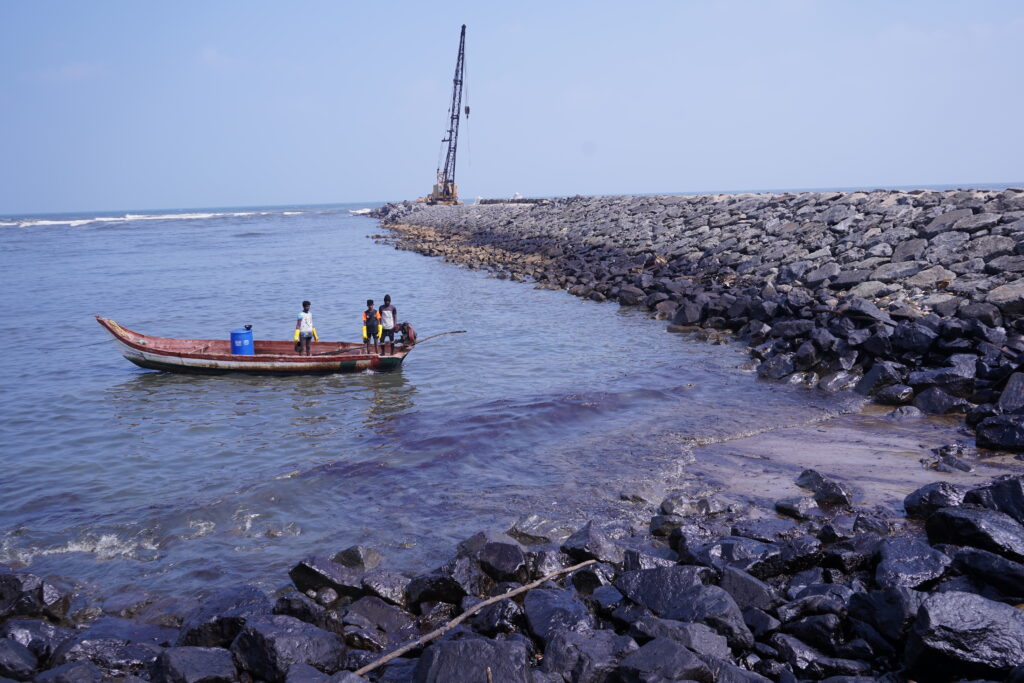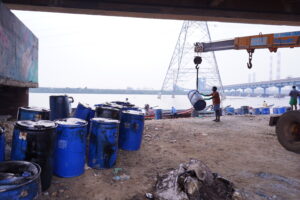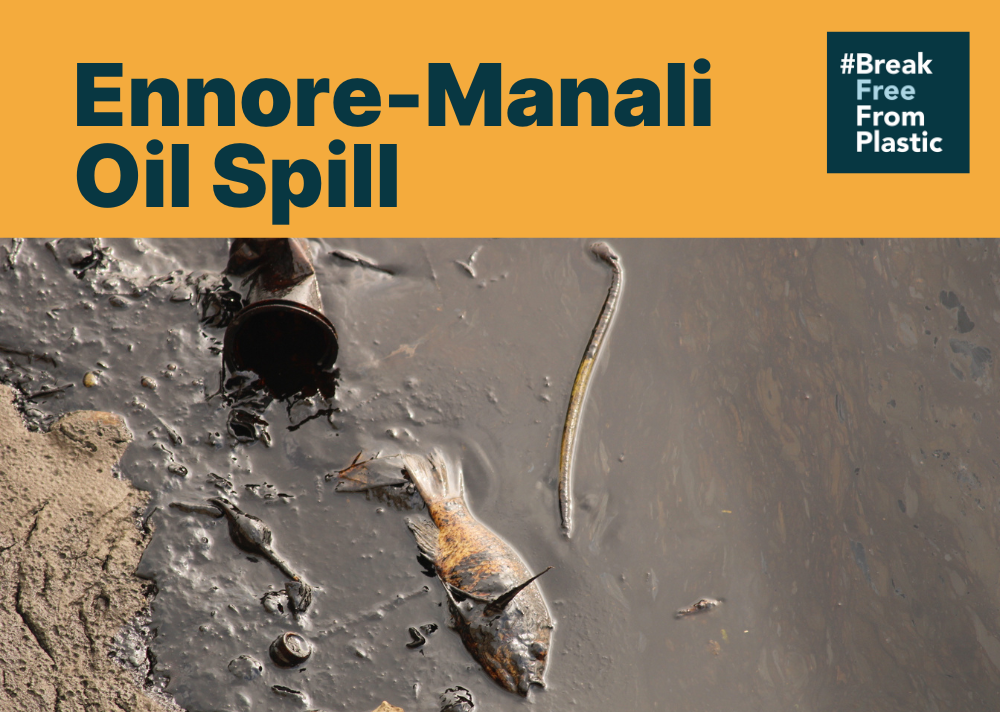Chennai, 15th February 2024 - On December 4, an oil spill was recorded at the Chennai Petroleum Corporation Limited (CPCL). Exacerbated by floods following Cyclone Michaung, the sheet of oil extended into Buckingham Canal and Ennore Creek, silently wreaking havoc on the local ecosystem and threatening the livelihoods and health of thousands of fishermen.
The Ennore-Manali area hosts 36 large, red-category petrochemical and other factories - representing the densest concentration of fossil-fuel industries in south India. Petrochemical industries are the key source of raw materials for plastic production, and clusters like Ennore-Manali produce huge volumes of single-use plastics, packaging materials, and various consumer plastic goods. An oil spill, resulting from the negligence of petrochemical industries, not only causes immediate environmental harm but also serves as a harbinger of the more extensive issue of plastic pollution.
Ennore-Manali, a hub of petrochemical industrial units has been flagged as critically polluted by the Central Pollution Control Board (CPCB) for nearly a decade. A study titled 'Poison in the Air' by BFFP-AP member, the Chennai Climate Action Group (CCAG) found that industrial units in this region violated emission standards for over half the year in 2019. Some community stories from this region, compiled by BFFP-AP member, Centre for Financial Accountability (CFA), have also been featured in our Toxic Tours - Manali chapter.
While the Ennore-Manali cluster has gained attention as an illustrative case of climate recklessness, the December oil spill is yet another chapter in the region's grim narrative of environmental degradation.

Cleanups are like a band-aid on an oozing sore, disaster management needs so much more.
After the oil spill, CPCL claimed to have worked on a ‘war footing’ in collaboration with the Tamil Nadu Pollution Control Board (TNPCB) and state authorities, yet the local communities say otherwise. The delayed response in addressing the Ennore oil spill was exacerbated by the absence of a contingency plan for industrial accidents in Tamil Nadu, which most other states have. What’s more, the state government doesn’t even have the right equipment to deal with such a disaster – placing local communities living near the petrochemical cluster at high risk.
In a sense, the industrial cluster of Ennore, and its local communities live in the shadow of environmental and anthropogenic disasters.
More than two months later, marginalised communities face the most severe repercussions. Fisherfolk, dependent on the creek for their livelihoods, face an uncertain future as the oil permeates every aspect of their daily lives – from the bottom of their fishing boats to the nets they cast into the waters. Their oil-laden catch is deemed unfit for consumption, leaving fisherfolk with little choice but to watch their stock go to waste. Compensation plans announced by the government, though well-meaning, have fallen far short of addressing the long-term consequences faced by the affected families.
Mr. Prabakaran. V of the Poovulangin Nanbargal echoes,
“The pollution control board and CPCL have not disclosed the quantity of oil spilled, nor its toxic characteristics. Analysis of an oil sample by a private media house revealed the presence of eight volatile organic compounds, including Benzene, Toluene, and Styrene, and sixteen Polycyclic Aromatic Hydrocarbons (PAHs) such as Naphthalene, Fluorene, and Anthracene, exceeding permissible limits.
According to the Bureau of Indian Standards for drinking water, total petroleum hydrocarbons should be at 0.1 parts per billion, but the tested water showed an alarming level of 3,240 parts per billion. Volatile Organic Compounds like Benzene, Styrene, and Ethylbenzene were found to be 50 to 60 times above the standards.
For over a week, residents of Ernavoor (Kargil Nagar, V.P Nagar, Adhidravidar Kudiyirupu, Sattankadu & Brindhavan Nagar) were exposed to hazardous oil as it entered their houses with flooded water. Fishermen, involved in the cleanup without proper protective gear during the initial days, were also at risk. Individuals exposed to the oil are already experiencing health issues such as skin problems, eye irritation, throat irritation, breathing problems, continuous fever, headaches, and fatigue. Despite these challenges, affected villages have not received any medical treatment. Given the presence of carcinogenic substances like benzene, toluene, styrene, and other PAHs, immediate medical screening is imperative for the residents of the affected villages.”
Pradip Chatterjee, the convenor of the National Platform for Small Scale Fish Workers (NPSSFW) highlights,
“The Ennore oil spill was followed by another disaster of gas leak from the same plant. Many people fell sick. Victims of the oil spill are yet to be compensated. NPSSFW demands immediate closure and removal of the Ennore CPCL Refinery.
Our demands are clear: immediate compensation and support for fish workers affected by the oil spill, withdrawal from hazardous cleaning operations, continuous health monitoring, and accountability from polluters like CPCL. It's time to prioritize the livelihoods and well-being of our communities and ecosystems."
Access the Press Release by NPFSSFW.

Lokeshwaran E, a volunteer at Chennai Climate Action Group adds,
"A catastrophic man-made disaster has unfolded, yet CPCL has failed to accept responsibility. Not only humans but all living beings have been subjected to hazardous chemicals, resulting in severe skin and respiratory ailments for people, while birds are left vulnerable, soaking in oily waters. Ennore's already fragile ecology has been further ravaged by this oil leak, exacerbating the situation. Compensation funds offered are merely superficial gestures, failing to address the profound impact on people's lives."
Industrial clusters like Ennore-Manali, with petrochemical, fertilizer, and thermal plants are susceptible to various disasters like chemical spills, gas leaks, explosions and fires, more so, as a coastal area prone to annual flooding. Systemic solutions would include placing a stay on the operations of high-risk, highly-polluting, non-compliant industries like CPCL, until more stringent regulations for the petrochemical and affiliated industries are in place and adhered to, a planned phase-out of non-essential plastics and linked polymers and a just transition of workers in the refineries and affected communities.
With India’s petrochemical industry projected to grow at a CAGR of 9-10%, it is imperative that we strengthen regulatory frameworks, implement proactive monitoring systems, and ensure the strict adherence of industries to safety protocols. These measures can safeguard the well-being of communities, preserve the environment, and secure sustainable economic development.
The Ennore-Manali incident serves as a poignant reminder that robust oversight and stringent regulations are not just prerequisites but a moral responsibility to prevent and mitigate the adverse impacts of industrial activities on our planet and its inhabitants.
For media inquiries, please contact:
Devayani Khare, Regional Communications Officer: devayani@breakfreefromplastic.org
About BFFP — #BreakFreeFromPlastic is a global movement envisioning a future free from plastic pollution. Since its launch in 2016, more than 2,700 organizations and 11,000 individual supporters from across the world have joined the movement to demand massive reductions in single-use plastics and push for lasting solutions to the plastic pollution crisis. BFFP member organizations and individuals share the values of environmental protection and social justice and work together through a holistic approach to bring about systemic change. This means tackling plastic pollution across the whole plastics value chain – from extraction to disposal – focusing on prevention rather than cure and providing effective solutions. www.breakfreefromplastic.org.
Supporting Organizations
Poovulagin Nanbargal is an environmental organization working independently in Tamil Nadu for more than 30 years now. It deals with environmental issues, natural conservation, and developmental issues based on a scientifically constructive approach. https://poovulagu.org/
The National Platform for Small Scale Fish Workers (NPFSSFW) works to help the fishing communities access the rights and entitlements provided to them by the Government and also to raise and push forward with further needs as and when required. https://smallscalefishworkers.org/
The Chennai Climate Action Group is a youth-led environmental justice collective that advocates the rights of marginalized, under-represented and unrepresented communities of current and future generations of human and other life-forms. CCAG uses science, law and media to support community struggles against environmental injustice. https://chennaiclimateactiongroup.wordpress.com/
Centre for Financial Accountability (CFA) aims to bring accountability in financial institutions that lend money to development projects, through research and campaigns. https://www.cenfa.org.




